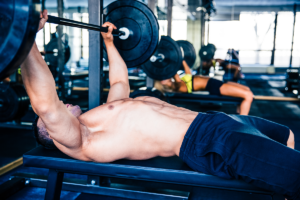
Everyday Chemicals Are Screwing Up Your Testosterone
You may have already read my other article on 7 habits which are killing your testosterone. There was a section in that on Water because

Glycerol is becoming increasing popular among athletes as science continues to refine how we supplement with it.
In this article I will discuss what glycerol is as well as the benefits you may get from taking it pre-workout.
Glycerol, also known as glycerine is an essential element of triglycerides which are the main type of fat in the bloodstream, natural fats and oils.
However, the “tri” part refers to the fatty acids and there is no actual fat in “glycerol” which is sweet tasting, non-toxic and will not raise your triglyceride levels.
Glycerol contains 4 calories per gram (just like protein and carbohydrates) and it must be converted to glucose by your liver so it will not spike your insulin or raise blood glucose levels.
Endurance athletes trying to protect themselves from dehydration have long used glycerol to hyper-hydrate and it has been shown in human case studies to be safe, rapidly absorbed and very effective. (1)
Glycerol creates what is scientifically referred to as an “osmotic gradient” in the circulation which favors fluid retention. In other words, it’s great at pulling water into your muscles and cells. (2)
In fact, endurance athletes training or racing in extreme temperatures have been known to consume as much as 1.2 grams for every kilogram of bodyweight in the hour leading up to their event for some pretty extreme hydration.
That level of consumption, however, is in far excess of what most people need to hydrate their body and as I will discuss later in this article, there are new formulations of glycerol which make day to day use much more simple.
Every athlete and bodybuilder looking to increase muscle size wants to increase the amount of muscle pump they get in the gym. It’s even better when that pump remains outside of the gym.
Muscles simply look better when the cells are swollen and full. There are two ways to help achieve this with supplementation.
You can increase the amount of nitric oxide and blood flow by supplementing with l-citrulline and/or nitrosigine and you can hyper-hydrate your muscles with creatine and/or glycerol.
Glycerol has been shown to have a positive effect on both aerobic and anaerobic power output as well as a 21 – 24% increase in endurance time. (3)
Researchers are unclear as to exactly why there seems to be a positive effect. One hypothesis is that increase in hydration helps delay the onset of either muscle or central nervous system (CNS) fatigue.
Exercises like squats and deadlifts can really tax your CNS, so if glycerol supplementation does help delay CNS fatigue, it may help you power through those extra tough workout days in particular.
There is also believed to be a direct correlation between glycerol ingestion and energy production. (3)
No matter the exact cause of the boost in performance, several studies have shown a positive effect for athletes, especially in hot temperatures. (4, 5, 6, 7, 8)
Researchers at the University of Glasgow in Scotland wanted to find out if glycerol could hydrate as well as creatine and what would happen if they combined both ingredients.
What they found was pretty astonishing!
24 participants were ran through a series of experiments over 7 days where they ingested either creatine or glycerol and where they ingested both creatine and glycerol at the same time.
The researchers discovered the participants who took glycerol and creatine had almost 40% more fluid weight than the participants who only took creatine and nearly 50% more fluid than those who only took glycerol. (9)
Some people wonder if this fluid increase will have a “soft” look and the answer is absolute not because the water increase from glycerol is mostly in the blood.
To be more precise it increases the volume of plasma in your body.
So if you want to get that hardcore, skin-tearing pump, combine them both in your pre-workout!
The reason why glycerol has never really taken off for daily use has been because of the amount you have had to consume pre-workout.
Athletes would frequently take upwards of 10 – 30 grams along with 32 ounces of water a full hour before their workout and that’s just a lot of effort.
This is because traditionally, the only way to supplement with it was to buy glycerol monostearate or GMS which has a short shelf life, is not very stable and is only 5 – 12% actual glycerol.
Scientists have discovered that specially formulating 65% glycerol with 35% silica allowed them to create a much more potent supplement that is highly stable and has up to a 3 year shelf life.
This also allows you to start seeing solid benefits at about 1.5 – 2 grams vs 10g since the potency is potentially more than 10x stronger.
The process to create the 65/35 split is rather complicated and there are currently only two companies which make the product. You can find it under the trademarked names HydroMax and GlycerSize.
They do not sell directly to consumers but it’s not hard to do a google search for either name and find a company who does sell it either as a stand alone or more commonly mixed in a pre-workout.
In general, reviews on both products are good as would be expected since for all practical purposes they are virtually identical.
Some people do feel that GlycerSize mixes a little better which is attributed to their proprietary spray drying technology.
Between 2010 – 2018 glycerol was banned by the WDA as they thought if someone took enough of it, the hydration levels achieved may be able to hide other substances such as steroids.
This was later proven to be false, however, and as of January 2018, WDA lifted the ban so it is not banned by the World Anti-Doping Agency.
You can read the lift on the ban here on WDA’s website.
Side effects from glycerol consumption are rare and in fact are almost unheard of in the lower dose/high absorption versions offered by HydroMax and GlycerSize.
The most common complaints at higher doses include:
References

You may have already read my other article on 7 habits which are killing your testosterone. There was a section in that on Water because

Rhodiola Rosea stands out as a potent adaptogenic herb with a rich history of traditional use and a growing body of scientific research. Revered for

In this comprehensive article, we will explore what L-tyrosine is, its benefits as a pre-workout supplement, the correct dosage, and other potential health benefits it

Betaine anhydrous is becoming an increasingly popular ingredient for pre-workouts. In this article, we will explore the fundamentals of betaine anhydrous, its connection to carnosine,

Beta-alanine is a pre-workout powerhouse. From boosting workout performance to potential anti-aging effects, discover why this amino acid is a favorite among health buffs.

You may have already read my other article on 7 habits which are killing your testosterone. There was a section in that on Water because

Rhodiola Rosea stands out as a potent adaptogenic herb with a rich history of traditional use and a growing body of scientific research. Revered for

In this comprehensive article, we will explore what L-tyrosine is, its benefits as a pre-workout supplement, the correct dosage, and other potential health benefits it
Discount Applied Successfully!
Your savings have been added to the cart.